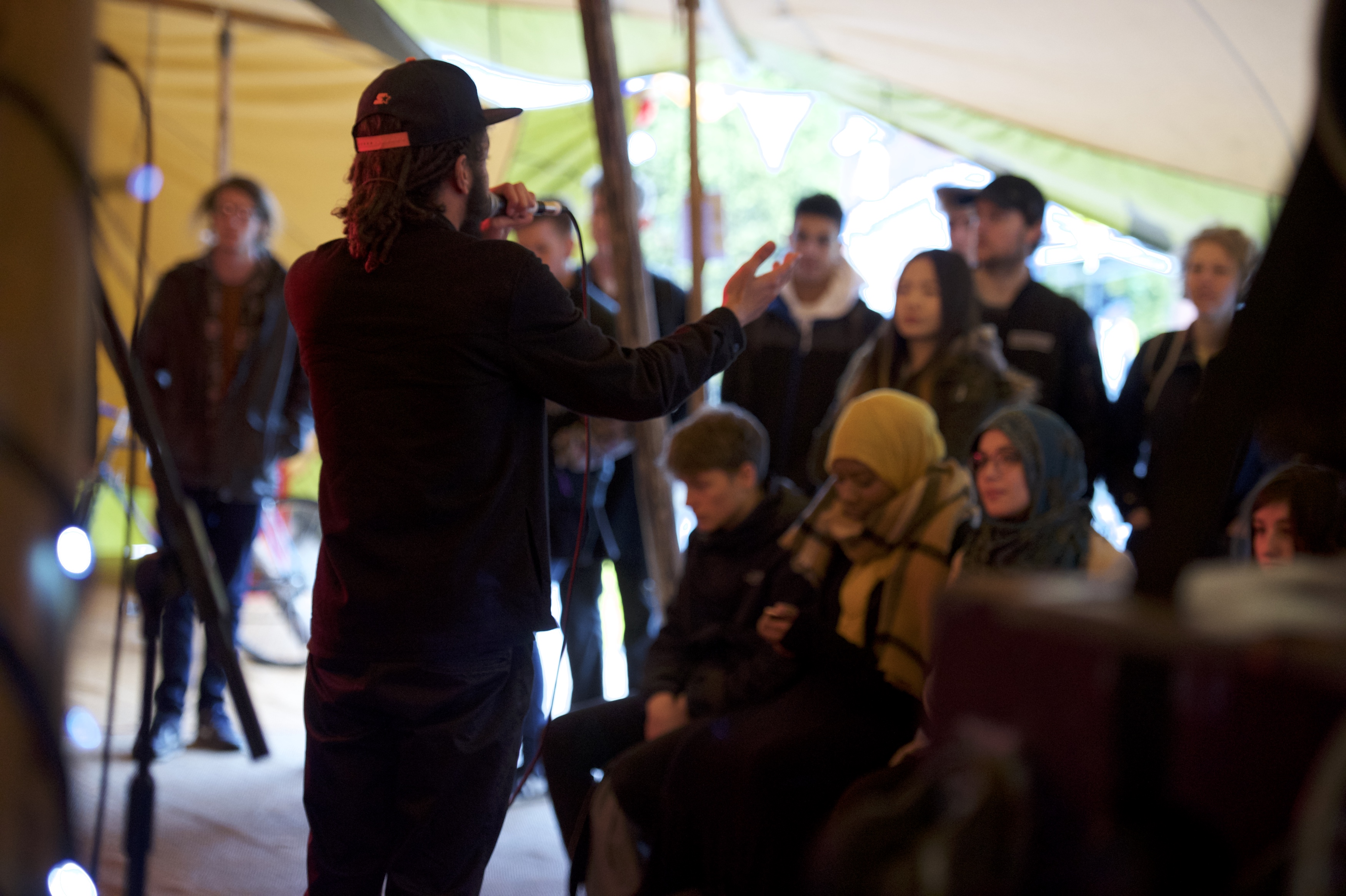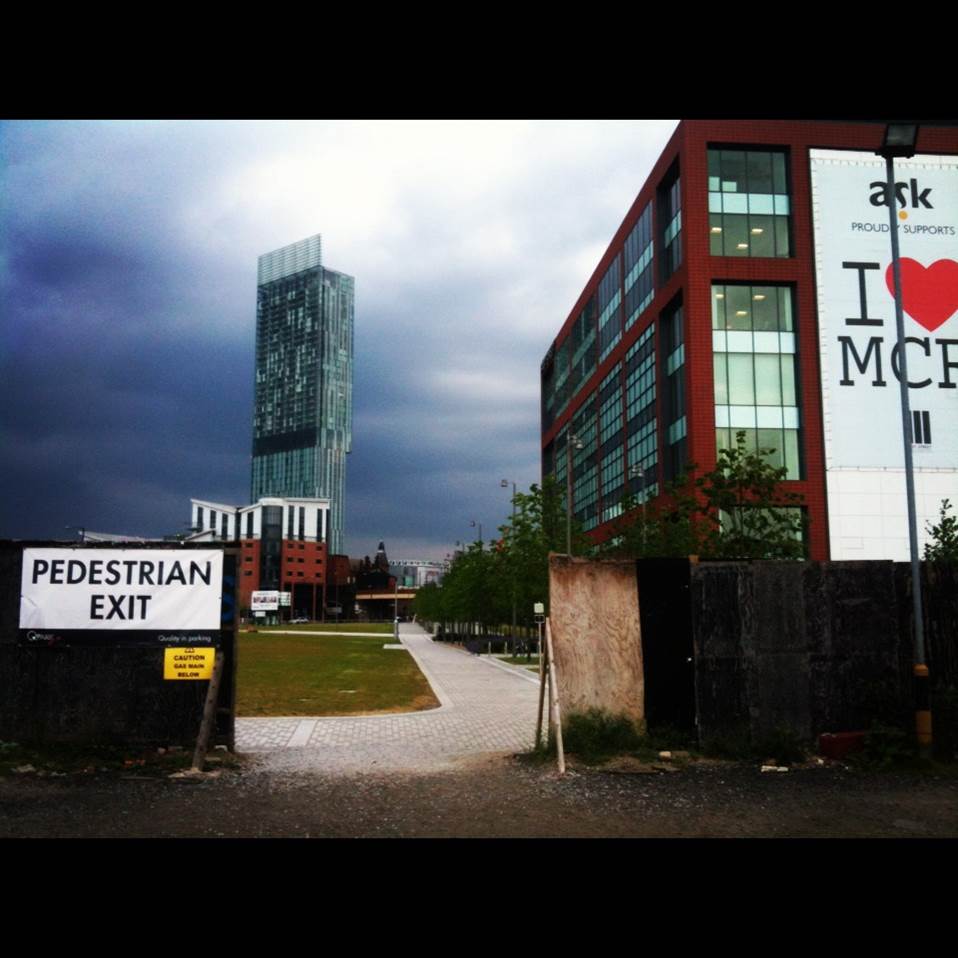Abi Gilmore looks at why policy-making for the arts and culture is an important area when considering the implementation and impact of DevoManc.

Justfest, University of Manchester Social Responsibility team
Cultural policy is often an afterthought, frequently side-lined by other policy debates on health, housing and crime reduction. When decision-making for the arts makes the news, it is usually in relation to some perceived injustice, which either falls outside of prevailing norms of what art and culture is valuable (e.g. consternations over the national follies of Lottery funding for the Millennium Dome) or fares poorly in comparisons with other policy areas which assume greater social need (e.g. funding for public art in hospitals compared with hospital beds).
At a local level, cultural policy is similarly misunderstood, and at present devolution plans for Manchester culture are under developed but I’d argue that its relevance to the devolution agenda cannot be emphasised enough. Local cultural policy has traditionally been the mandate of local authorities which, through arts, culture, leisure, tourism, sports and heritage directorates, have supported local cultural infrastructure in partnership with a range of national funding bodies, such as Arts Council England, the Heritage Lottery Fund, and the DCMS, as well as other charitable trusts and foundations. The arts are rarely publicly funded solely for intrinsic value, however, and the case for investment in the arts and culture is increasingly tied to extrinsic benefits. Debates over this so-called ‘instrumental’ policy making are relevant to the newly-devolved and decentralised mandates over health and social care and criminal justice, as well as Northern Powerhouse initiatives to pump-prime regeneration and economic development.
Tough competition
We are seeing irrevocable change in the role of local authorities in cultural management. As non-statutory areas of local authority responsibility (bar libraries at unitary level), the funding for visual and performing arts, museums and heritage is in tough competition with other services, and in pursuit of outcomes which serve these other policy agendas. Some of the newly devolved mandates for local authorities will see increased utility of the arts for social change, for example, participatory arts within dementia care or in other areas of responsibility such as criminal justice. In an already complex environment, the rationale and infrastructure for cultural commissioning needs further investigation, building on the body of research and evidence that is already being developed to make the case and to monitor and evaluate outcomes.
As local authorities become more enablers than funders, artists and organisations will be asked to play increasingly independent roles as mediators, entrepreneurs, strategists and advocates of the ways in which they can contribute to local place-making. In the face of austerity, public funding for the arts is politically difficult to defend, and as some have predicted, continuing funding cuts diminish local capacity to maintain cultural institutions and collections for their own intrinsic value in the face of rising social care budgets. As recent decisions by Lancashire County Council suggest, there is a danger of losing distinctive parts of Northern cultural heritage forever.

First Street, Manchester, the site of Home, 2012, A.Gilmore
Northern Powerhouse
By contrast, there is significant forthcoming central investment into new local arts infrastructure in the North under the brand ‘Northern Powerhouse’, with the aim of stimulating regional cultural economy. In Manchester the Factory is a planned £110million performance space granted £78m of central government investment plus a further £9m towards annual revenue costs. It will be sited at the heart of a massive new development zone, St Johns, mixing residential use and culture into Manchester’s legal and financial services district.
On announcement of this new home for Manchester International Festival, groans were audible across the regional arts sector, and concerns raised about the potential impact on audiences and on other revenue funding for the rest of the still largely publicly-funded performing arts sector. It is unclear whether the ‘positive externalities’ of a new production house for arts and creative industries will reach the parts of the city-region which have no access, or interest, in a Rem Koolhaas building in the city centre.
As our research on Understanding Everyday Participation is showing, culture is more than access to cutting edge production spaces within formal institutions. Cultural participation offers connections to others through everyday experiences and meanings. Many of these forms of participation – in church groups and parks, schools and colleges, amateur theatre and dance groups, and local community centres – are also affected by funding cuts, yet it is unclear how devolution will increase these resources.
However, the tantalising prospect of unique production facilities and the challenges of coordinating and up-scaling skills and opportunities for local arts and creative practitioners may yet cement Manchester’s position as a flagship of regional arts-led, place-based cultural policy. It is already politically significant in the airspace it has given the city for relationships with central government.
Regional inequalities and devolution
This echoes recent soul-searching within central policy bodies, after criticism from a Select Committee review of Arts Council England and an independent consultants’ report, Rebalancing our Cultural Capital, which demonstrated how heavily weighted arts funding is towards London. A further Select Committee is currently taking place looking at disparities in broader cultural terms. National policy is attempting to reconfigure arts funding and end regional and spatial inequalities, as re-iterated in the DCMS White Paper on Culture, and new devolution arrangements may be one way to address this. The latest budget spread this Treasury largesse further across the region, with a Shakespeare North project promised to Merseyside, a competition to host the Great Exhibition of the North, and funds committed to Hull’s UK City of Culture year, however there remain questions about how funding can be allocated more equitably when the Chancellor’s pockets are not bottomless.
Whatever forms arts and cultural policy takes under devolution, two things are certain: firstly, that the arts are being perceived as a means to an end, with continued rhetoric of ‘returns’ on investment, and secondly the need to work through new and existing partnerships. In Greater Manchester, there has been a longstanding partnership working across the combined authorities, with the national funding bodies and with local arts and cultural sector, led by a Joint Director of Culture (itself a partnership between the city, its university and its cultural assets).
Manchester makes a great show of its commitment to the arts, but for the artists and cultural organisations of the city to deliver on important instrumental agendas such as those being made for health and social care, new relationships and infrastructure will be needed.
So as the story of DevoManc unfolds, it will be important to continue to research how decisions and choices are made, to truly understand its effects on the arts and the cultural policies of the North.
This post was first published on Manchester Policy Blogs.
The Faculty of Humanities and School of Arts, Languages and Cultures at The University of Manchester are hosting a half-day conference, The Art of Devolution: Culture and the North. The conference will provide a space for civic, cultural and academic partners across the North to consider plans and ambitions for arts and culture in times of changing governance, funding and accountability. It will also launch a series of research, policy and practice exchange workshops hosted by the University on the theme of cultural policy and devolution in the North.
The conference will take place on Tuesday, 14 June 2016 at the Old Granada Studios in Manchester. For further information and registration please visit The Art of Devolution Eventbrite page.
To register an interest in hearing more about the workshops please email Claire Lloyd.
